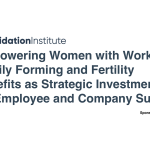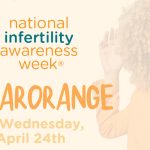
Parents and families come in all shapes and sizes as do those who would like to become parents. At ARC Fertility, we’re committed to helping everyone who wants to build a family – no matter who they love – make their dreams a reality.
We embrace diversity because we know that wanting children is something that transcends all backgrounds – whether you are partnered, single, straight, gay/lesbian or transgender. Today, the path to building your LGBTQ family is diverse, too. With assisted reproductive technology (ART) one – or several – fertility treatments may work for your unique situation.
At ARC Fertility, helping you find your path to success is our mission. We can help with:
- Information about clinics and support resources
- Programs and packages designed to make treatment affordable
- Sharing information with your employer about adding family building
- A Concierge Fertility Team to discuss programs, financing and logistics
- Finding a member clinic near you that will share their success rates
Information About Treatment Options
There are a variety of treatments that might be right for you including reciprocal IVF (almost identical to standard IVF), intrauterine insemination (IUI), gestational carrier (also known as surrogacy), along with egg, embryo and sperm donation and egg freezing. To learn more about our fertility coverage for your situation, please click on the links below.
Each treatment approach has different decision points along the way. Talking to fertility specialists, mental health professionals and lawyers who specialize in family law and family building is highly recommended.
Gaining Employer Coverage for Family Building
The good news is that employer fertility coverage for treatment is improving: 66% of employers will offer fertility benefits by 2019, up from 55% in 2017.
Still, there’s still plenty of room for improvement. Gaps and restrictions mean that coverage isn’t always as helpful as it could be. For example, some policy requirements that must be met before qualifying for fertility coverage simply don’t apply to same-sex couples or single people.
Fortunately, as employers work to create a more diverse-friendly work environment, it may extend to offering coverage for fertility services and adoption for all employees.
If your workplace does not currently offer family building benefits, there’s help available. ARC works directly with employers, documenting the low incremental cost to adding a fertility benefit to health coverage. Designed correctly, a benefit can also help achieve the best clinical outcomes. We work with employers of all sizes to custom design a fertility benefit that works for all.
You can contact us directly to find out more about the ARC® Employer Fertility Program and how we can work with your employer to add or improve family building benefits.
Advice and resources are also available from RESOLVE: The National Infertility Association including how to talk to your employer about adding fertility benefits. It is your employer – not an insurance company – that makes decisions on whether – and how – to cover fertility treatment.
Research shows offering such benefits can have an enormous impact on an organization’s ability to attract and retain employees who are likely to be more satisfied and productive. And, employers are usually unaware of how little it costs to add such coverage. Most think it is quite expensive—it is not.
Everyone Deserves Access to Infertility Treatment
The cost of becoming a parent using ART can be high, limiting access for many. Insurance may cover part of your treatment, but there are often gaps that require significant out-of-pocket costs for you. In the case of using a gestational carrier (which may cost as much as $100k-$200k including legal fees and agency fees), all the costs are seldom covered by insurance. Some clinics – including many ARC member clinics – offer a package that covers many of the medical procedures and monitoring.
To help make the entire process – and the various parts – more affordable, we offer treatment packages and affordability options. For specific details about each, please click on the links below or contact ARC.
IVF – The ARC® Success Program or The ARC® Cycle Plus Programs and ARC Financing
Affordable Fertility Drugs – The ARC® Pharmacy Plan
In addition, there are other resourcesavailable that offer grants and scholarships to make family building affordable.
Additional Resources for Support
Other organizations provide information and support to LGBTQ-focused family building including adoption. The Family Equality Council Path2Parenthood program offers comprehensive information, resources and support to the LGBTQ community through written materials, in-person educational events, and videos. Click here to download a copy of the 2019 Family Building Guide.
RESOLVE also offers information and resources on many family building options. They also host in-person support groups across the country.
Also, a private Facebook group – ThePath– offers a safe and supportive space to connect with other hopeful LGBTQ parents to share experiences, celebrate success stories and find support on the journey to becoming a parent.
What Are Next Steps?
Today, it’s gratifying that advanced reproductive technology can help so many different people who aspire to be parents. However, the process can be both complicated and expensive.
Depending on the approach you select, there may be issues and expenses to consider beyond the clinical. You may need to consult an attorney who specializes in fertility issues and pay agency fees for egg, embryo and sperm donation and selection of a gestational carrier or surrogate.
Our best advice is to consult experts and gather information for informed decisions. Your doctor can discuss the different types of treatment that may work best for you and your partner. It is also important to understand the various success rates and know what your insurance will or will not cover.
While it is an exciting time, the process may also be stressful. There are emotional issues to consider along your path to parenthood, too. Most clinics have a counselor on staff who specializes in fertility issues or can refer you to professionals they recommend. They can also refer you to best agency to help with donor eggs, embryo and sperm.
We know this process to becoming a parent requires a considerable investment of time, energy, and money, not only for the medical treatment but also for the agency fees, legal contracts, and other expenses for the involved parties. Still, is there any better investment? We don’t think so!






